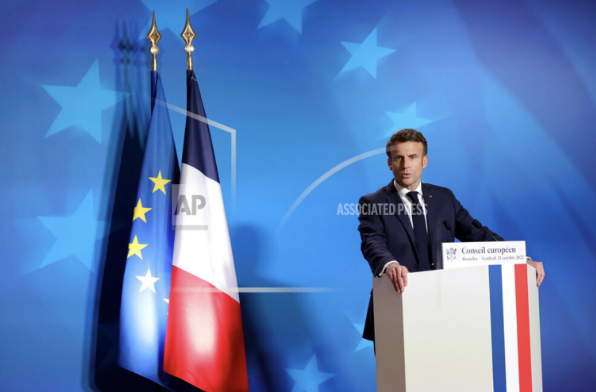France Leaves Controversial Energy Treaty
France is the latest country to pull out of the Energy Charter Treaty, which protects fossil fuel investments from policy changes that pose threats to profits. This action comes as more countries are attempting to implement more climate-friendly policies. The withdrawal of France moves them more in line with the Paris Climate Agreement of 2016 and its goal of cutting carbon emissions through 2030, a task climate experts called ‘incompatible’ with the energy charter. France’s announcement follows the decisions of the Netherlands, Poland, Italy, and Spain to withdraw from the treaty.
French President Emmanuel Macron speaks at an EU summit in Brussels on Friday, Oct. 21. Photo: Olivier Matthys / AP
Signatories of the Energy Charter Treaty face potential lawsuits from investors who may believe that their assets are put under threat due to policy changes. For instance, Germany’s RWE, a large energy company, is suing three European governments regarding fossil fuel investments. Amandine Van den Berghe, a trade and environment lawyer at ClientEarth, described France’s leave from the treaty as “another blow to the ECT” and that it “shows how difficult it will be for the EU itself as a party to stay in the treaty.” Potential lawsuits pose a significant risk towards governments trying to adapt more green policies to help the growing issue of climate change.
The 1994 charter caused problems as it heavily protected fossil fuel interests, which directly contradicts the EU member states’ commitment to lower carbon emissions according to the Paris Accords on climate change. Member states of the EU have brought up the need to revise the treaty so that it aligns more with future environmental goals. Such a revision could include that all further investments in fossil fuels would be discouraged. Earlier last month, France planned to invest more in renewable energy like wind and solar power. This move was a result of the energy crisis caused by the war in Ukraine, making French President Macron want to make the country more independent on its own source of wind power.
The treaty’s revision process did not go well, hence why France was motivated to withdraw from the treaty. Rob Jetten, the Dutch energy and climate minister, commented that despite the changes added to the treaty, it still gave “too much protection to the fossil fuel industry." Moreover, Martin Dietrich Brauch, an economist at the Columbia Center on Sustainable Investment, added that the reform measures taken simply “missed the mark in nature, scope, ambition and speed" to address the risks that the treaty poses towards the EU’s climate goals. France’s withdrawal from the treaty will take a year to be finalized, and in the meantime France will likely focus on aiming to reduce the duration of a “sunset clause” in which the ECT allows retrospective lawsuits to be made.
A coal fueled power plant near Luetzerath, western Germany, on Oct. 16. Photo: Martin Meissner / AP
Originally the treaty was enacted to protect western energy firms that were working in former Soviet countries, and allowed investors to sue governments that made policies that would hinder their finances. Critics have pointed out that the total final compensation to these fossil fuel companies could rise to trillions of dollars. Perhaps the lessons from this treaty, paired with the growing pressure on EU member states to stop relying on Russia’s gas, and energy crisis, will push the EU as a whole to implement green sources of energy more than ever before.


